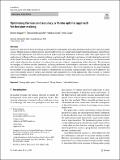| dc.contributor.author | Nagpal, Rashmi | |
| dc.contributor.author | Shahsavarifar, Rasoul | |
| dc.contributor.author | Goyal, Vaibhav | |
| dc.contributor.author | Gupta, Amar | |
| dc.date.accessioned | 2024-07-22T17:13:47Z | |
| dc.date.available | 2024-07-22T17:13:47Z | |
| dc.date.issued | 2024-07-18 | |
| dc.identifier.issn | 2730-5953 | |
| dc.identifier.issn | 2730-5961 | |
| dc.identifier.uri | https://hdl.handle.net/1721.1/155737 | |
| dc.description.abstract | In the era of data-driven decision-making, ensuring fairness and equality in machine learning models has become increasingly crucial. Multiple fairness definitions have been brought forward to evaluate and mitigate unintended fairness-related harms in real-world applications, with little research on addressing their interactions with each other. This paper explores the application of a Minimax Pareto-optimized solution to optimize individual and group fairness at individual and group levels on the Adult Census Income dataset as well as on the German Credit dataset. The objective of training a classification model with a multi-objective loss function is to achieve fair outcomes without compromising utility objectives. We investigate the interplay of different fairness definitions, including definitions of performance consistency and traditional group and individual fairness measures, amongst each other coupled with performance. The results presented in this paper highlight the feasibility of incorporating several fairness considerations into machine learning models, which can be applied to use cases with multiple sensitive features and attributes that characterize real-world applications. This research is a valuable step toward building responsible and transparent machine learning systems that can be incorporated into critical decision-making processes. | en_US |
| dc.publisher | Springer Science and Business Media LLC | en_US |
| dc.relation.isversionof | 10.1007/s43681-024-00508-4 | en_US |
| dc.rights | Creative Commons Attribution | en_US |
| dc.rights.uri | https://creativecommons.org/licenses/by/4.0/ | en_US |
| dc.source | Springer International Publishing | en_US |
| dc.title | Optimizing fairness and accuracy: a Pareto optimal approach for decision-making | en_US |
| dc.type | Article | en_US |
| dc.identifier.citation | Nagpal, R., Shahsavarifar, R., Goyal, V. et al. Optimizing fairness and accuracy: a Pareto optimal approach for decision-making. AI Ethics (2024). | en_US |
| dc.contributor.department | Massachusetts Institute of Technology. Computer Science and Artificial Intelligence Laboratory | |
| dc.relation.journal | AI and Ethics | en_US |
| dc.identifier.mitlicense | PUBLISHER_CC | |
| dc.eprint.version | Final published version | en_US |
| dc.type.uri | http://purl.org/eprint/type/JournalArticle | en_US |
| eprint.status | http://purl.org/eprint/status/PeerReviewed | en_US |
| dc.date.updated | 2024-07-21T03:13:53Z | |
| dc.language.rfc3066 | en | |
| dc.rights.holder | The Author(s) | |
| dspace.embargo.terms | N | |
| dspace.date.submission | 2024-07-21T03:13:53Z | |
| mit.license | PUBLISHER_CC | |
| mit.metadata.status | Authority Work and Publication Information Needed | en_US |

